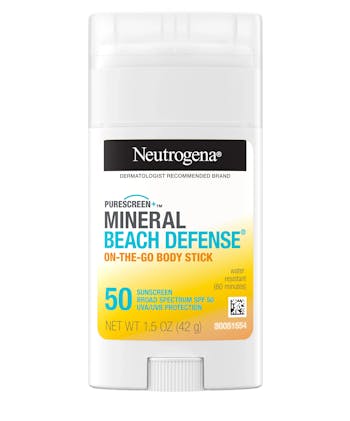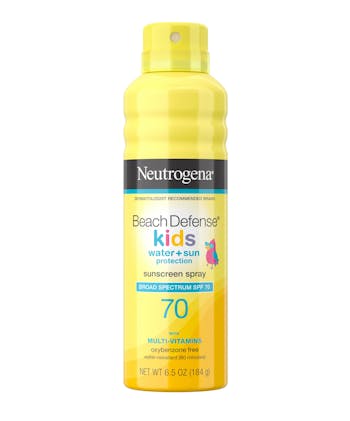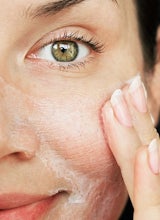¿Traje de baño? Listo. ¿Gafas de sol? Listo. ¿Sandalias? Listo. Y ahora lo más importante: ¿cuál es el mejor protector solar para tus vacaciones en la playa? Encontrar un protector solar que se adapte perfectamente a tus actividades diarias, desde el senderismo hasta el buceo, es clave para proteger tu piel. Así que piénsalo bien antes de meter en la maleta el envase del verano pasado y prepararte para partir.
Los daños causados por los rayos ultravioleta (UV) no cesan cuando empieza la diversión. Además, nadie quiere sufrir una quemadura solar durante las vacaciones. Así que sumérgete en el maravilloso mundo de la protección solar para conocer cómo proteger a tu familia para que solo deban pensar en la diversión. Porque tus recuerdos deberían incluir agua azul y brillante, no piel roja y descamada.
Todo sobre el SPF y su función en el protector solar
Comencemos por los números. El SPF, o factor de protección solar, indica el nivel de protección que proporciona el protector solar frente a los rayos UVB. Los rayos UVB afectan a las capas más externas de la piel y provocan quemaduras solares e inflamación. En cambio, los rayos UVA penetran en las capas más profundas de la piel y provocan daños a largo plazo. Los protectores solares de amplio espectro protegen contra ambos tipos de rayos.
Seguramente has escuchado que el SPF indica la cantidad de tiempo que tu piel está protegida al sol. Por ejemplo, un SPF 30 te protege de las quemaduras solares 30 veces más que si no usaras ningún tipo de protección solar. Pero la Administración de Alimentos y Medicamentos de EE.UU. desmiente este mito. El SPF indica la cantidad de protección que ofrece un protector solar, no la cantidad de tiempo. Así, un SPF 50 ofrece más protección UVB que un SPF 30. Pero es importante tener en cuenta otros factores a la hora de elegir el SPF.
Cómo elegir el número mágico
La hora del día a la que te expones al sol influye en el nivel de radiación UV al que recibes. Los rayos solares son más intensos entre las 10 a.m. y las 4 p.m. durante el horario de verano. Elige siempre un protector solar con un SPF de al menos 30, pero lleva algo más si vas a estar fuera durante esas horas.
Ten en cuenta también tu tono de piel. La piel clara es más propensa a las quemaduras solares, por lo que es mejor utilizar un SPF más alto si tienes este tipo de piel. Algunos estudios demuestran que un protector solar con SPF mayor de 30 es suficiente para los tonos de piel más oscuros, mientras que las personas con piel más clara se beneficiarían más si usan un protector solar con SPF mayor de 50.
Ingredientes esenciales de un protector solar eficaz
Los ingredientes de los protectores solares varían, y marcan la diferencia a la hora de elegir el mejor producto para tsus vacaciones. Para empezar, existen dos tipos de ingredientes en los protectores solares: químicos y minerales. Los ingredientes químicos, como la avobenzona, la oxibenzona, el homosalato, el octisalato y el octocrileno, penetran en las capas superficiales de la piel y absorben los rayos UV antes de que lleguen a las capas más profundas. Los ingredientes minerales, como el óxido de zinc y el dióxido de titanio, se asientan físicamente sobre la piel para impedir que penetren los rayos UV. Ambos tipos de protector solar te protegen del daño causado por el sol, pero algunas personas prefieren uno por sobre el otro.
Si te estás preparando para un día de actividades en el agua o buceo, consulta las normas del lugar sobre el uso de protectores solares. Algunas playas prohíben el uso de protectores solares con fórmulas químicas. Si no encuentras la información que necesitas con antelación, lleva un protector solar de fórmula mineral por si acaso.
Ingredientes que debes evitar
Si tienes la piel sensible, eczema u otros problemas en la piel es mejor evitar ciertos ingredientes. Por ejemplo, las fragancias sintéticas pueden estar relacionadas con reacciones alérgicas y sensibilidad cutánea. Si tienes piel sensible, evita los protectores solares con "fragancia" o "perfume" al principio de la lista de ingredientes.
Por qué es importante un protector solar resistente al agua
No hace falta aclararlo, pero una de las propiedades más importantes de un protector solar para las vacaciones en la playa es su resistencia al agua. El agua de la piscina, el agua salada y el sudor hacen que el protector solar se descomponga más rápidamente de lo que lo haría en otras circunstancias, dejando la piel vulnerable a los daños del sol. Los protectores solares resistentes al agua están diseñados para soportar el sudor y las actividades acuáticas y mantenerte protegido.
Ningún protector solar es totalmente resistente al agua. Los protectores solares resistentes al agua ofrecen 40 u 80 minutos de protección, así que lee bien la etiqueta y recuerda volver a aplicarlo cuando corresponda o después de secarte con la toalla.
Los mejores protectores solares para tus vacaciones en la playa
En barra
Prueba el protector solar en barra Neutrogena® Purescreen+® Mineral Beach Defense® On-The-Go Body Stick Sunscreen SPF 50, una práctica barra que se desliza suavemente. Esta fórmula activa 100% mineral es perfecta para una aplicación que no ensucia, por lo que es ideal para retoques rápidos cuando estás fuera de casa. Además, ofrece protección SPF 50 de amplio espectro para toda la familia y es apta para todo tipo de piel, incluida la piel sensible.
Aerosol para niños
Diseñado para la piel de los niños, el protector solar en aerosol Neutrogena® Beach Defense® Kids Sunscreen Spray Broad Spectrum SPF 70 with Multi-Vitamins proporciona una protección intensa frente al sol y el agua en una fórmula ligera de secado rápido con multivitaminas antioxidantes C y E. Es vegano, apto para todo tipo de piel y no contiene colorantes, parabenos ni oxibenzona.
Loción
Apuesta por lo clásico con la loción Neutrogena® Beach Defense® Water + Sun Protection Oxybenzone-Free Sunscreen Lotion Broad Spectrum SPF 70. Esta fórmula es superabsorbente y ofrece 80 minutos de resistencia al agua y es ideal para los nadadores más fuertes.
Incorpora el protector solar a tu rutina diaria de cuidado de la piel
Con el tiempo, toda exposición al sol contribuye al envejecimiento prematuro de la piel y a otros problemas cutáneos, por lo que la protección solar diaria es fundamental. Es probable que pases mucho tiempo al sol durante tus vacaciones en la playa. Sin embargo, los días lluviosos siempre se hacen presentes. No dejes de aplicarte protector solar en esos días, aunque vayas a estar en interiores . Los rayos del sol pueden llegar a tu piel a través de las nubes y las ventanillas del coche, y romper el hábito puede aumentar las probabilidades de que te olvides cuando sea crítico.
Cuando elijas tu protector solar diario, opta por un producto diseñado para tu tipo de piel. Por ejemplo, prueba un producto sin aceite si tienes la piel grasa o acné, o un protector solar hidratante si tu piel es más seca.
Consejos para aplicar el protector solar y maximizar su eficacia
Aplicarse protector solar antes de salir por la mañana es solo una parte de un plan de protección solar eficaz. Asegúrate de aplicar suficiente cantidad para cubrir todas las zonas de la piel que estarán expuestas, y vuelve a aplicar al menos cada dos horas o después de nadar, sudar o secarte con un toalla. La Academia Americana de Dermatología recomienda como cantidad suficiente 1 onza para los adultos. Por último, recuerda aplicar en las zonas que a menudo se pasan por alto, como las orejas, la nuca y los empeines.
Protegerse del sol en la playa
Aunque la protección solar diaria es esencial en cualquier lugar, tener en cuenta el entorno puede ayudarle a elegir el mejor protector solar para tus vacaciones en la playa. Cuando te prepares para tu escapada al mar, lleva un protector solar mineral con un SPF mayor a 30 y elige una fórmula en barra o en spray para facilitar su aplicación. ¡Cubre todas tus necesidades para que te ocupes solo de divertirte!
Preguntas frecuentes
¿Cuál es el mejor protector solar para la piel sensible?
Los protectores solares minerales y las fórmulas sin fragancias sintéticas ni alcohol pueden ser más suaves para la piel sensible.
¿Qué significa que un protector solar es "seguro para los arrecifes"?
Se trata de un término no regulado que hace referencia a los protectores solares elaborados con ingredientes minerales, como el óxido de zinc, y sin ingredientes químicos.
¿Se puede usar protector solar debajo del maquillaje?
Usar protector solar debajo del maquillaje es importante para mantener una piel sana y protegida. Elige una fórmula sin aceite para evitar obstruir los poros.
¿Con qué frecuencia debe aplicarse el protector solar en la playa?
Aplica el protector solar cada dos horas y después de nadar, sudar o secarte con la toalla.











